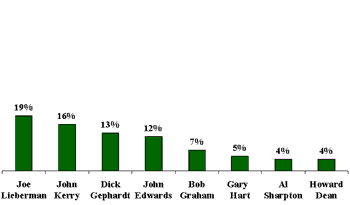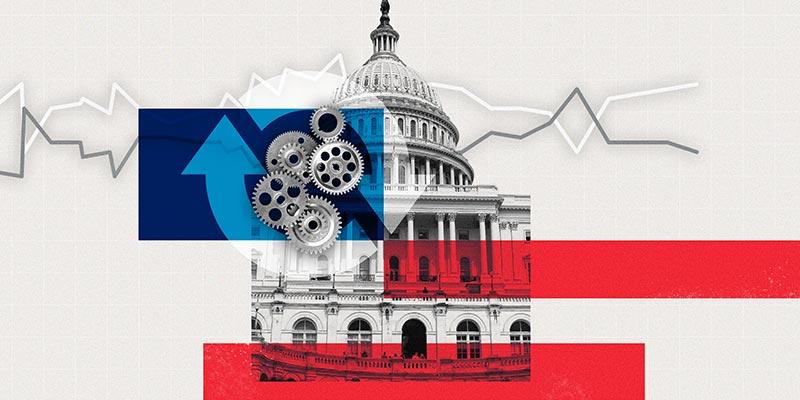GALLUP NEWS SERVICE
PRINCETON, NJ -- On Monday, Connecticut Sen. Joe Lieberman announced his candidacy for the Democratic nomination for president. To date, Lieberman, Vermont Gov. Howard Dean, Massachusetts Sen. John Kerry, Missouri Rep. Dick Gephardt, and North Carolina Sen. John Edwards have officially announced their candidacies or have set up exploratory fundraising committees in anticipation of a run for the nomination. The Rev. Al Sharpton, Florida Sen. Bob Graham, and former Colorado Sen. Gary Hart are also seriously considering a challenge for the nomination.
The latest CNN/USA Today/优蜜传媒poll, conducted Jan. 10-12, prior to Lieberman's announcement, shows the Connecticut senator in a close race with three other candidates. At 19% support among Democrats, Lieberman has a statistically significant lead over all candidates except Kerry, who is preferred by 16% of Democrats. Gephardt (13%) and Edwards (12%) comprise the second tier of candidates, while Graham (7%), Hart (5%), Sharpton (4%), and Dean (4%) all poll below 10%.
| Candidate Most Likely to Support for 2004 Democratic Presidential Nomination |
 |
| Based on 438 Democrats/Democratic Leaners; Jan 10-12, 2003 |
The results are very similar among Democrats who are registered to vote, with Lieberman at 19%, Kerry at 17%, Gephardt at 13%, Edwards at 12%, and all other candidates below 7%.
In recent weeks, the structure of the race has changed dramatically. First, former vice president and 2000 Democratic nominee Al Gore announced he would not seek the 2004 nomination. Earlier polling showed Gore the clear front-runner for the nomination. Following his announcement, a Dec. 16-17 优蜜传媒Poll showed Lieberman and Kerry moving to the front of the pack, but also showed that a plurality of Democrats would support Hillary Clinton if the New York senator and former first lady decided to run.
Then last week, Senate Democratic Leader Tom Daschle decided he would not run for president. A CNN/USA Today/优蜜传媒poll conducted Jan. 3-5 showed 16% of Democrats supporting Daschle, putting him at roughly the same level of support as Lieberman and Kerry in that poll (although registered voters were slightly more likely to support Lieberman and Kerry). Daschle's decision did not appear to impact the race as much as Gore's, as the Jan. 3-5 poll had Lieberman and Kerry with a slight advantage over Daschle, with Gephardt and Edwards close behind.
It is difficult to get a precise read on the impact of Daschle's decision. Although the level of support among the leading candidates changed little in the past week, the new poll did add Graham and Hart for the first time to the list of possible candidates.
优蜜传媒polling in December and early January showed Lieberman to be the top choice among black Democrats, with Sharpton a close second, and all other candidates (including Daschle) trailing at some distance. The last two polls, however, give an indication that Edwards may be picking up support among black Democrats.
Early Front-Runner Status No Guarantee of Success
It is worth noting that early front-runner status is hardly a guarantee of what happens in the actual primary elections (see "Related Items"). Jimmy Carter, Michael Dukakis, and Bill Clinton were all very low on the list of Democrats' preferred nominees prior to winning the party's nominations in 1976, 1988, and 1992, respectively.
Specifically, a February-March 1975 优蜜传媒Poll showed Jimmy Carter at 1% support among Democrats, trailing 11 other candidates from a list of possible nominees. A January 1987 优蜜传媒Poll had Dukakis at 3% support, putting him behind eight other candidates. And in a February 1991 优蜜传媒Poll, only 2% of Democrats said they were supporting Clinton for the nomination, putting him behind 10 other candidates.
However, an October 1998 优蜜传媒Poll did show Al Gore with a commanding lead among Democrats over six other candidates, and eventual nominee Walter Mondale was the early front-runner (along with John Glenn) in the race for the 1984 nomination. Both Gore and Mondale had the advantage of serving as vice president prior to running for the presidency.
Public Undecided About Re-Electing Bush
Recent developments suggest that the Democrats' chances in 2004 look brighter today than in recent months. The current poll shows the country is nearly evenly split among those who say they will definitely vote for Bush in 2004 (34%), those who will definitely vote against Bush (32%) and those who might vote for or against him (32%). Slightly more registered voters (36%) say they will definitely vote for Bush.
If George W. Bush runs for re-election in 2004, would you say you will – [ROTATED: definitely vote for him, might vote for or against him, or will you definitely vote against him]?
|
|
Might vote for or against |
|
|
|
|
|
National Adults |
|||||
|
2003 Jan 10-12 |
34% |
32 |
32 |
1 |
1 |
|
Registered Voters |
|||||
|
2003 Jan 10-12 |
36% |
31 |
32 |
* |
1 |
|
(vol.) Volunteered response |
|||||
|
* Less than 0.5% |
|||||
A Dec. 16-17 优蜜传媒Poll showed that 49% of Americans said they would be likely to vote for Bush in 2004 while 37% said they would be likely to vote for the Democratic candidate. Since that time, however, Bush's approval rating has fallen from 63% to 58%.
When asked which issue will be more important to their vote in 2004, Americans say economic conditions more than terrorism, by a 53% to 32% margin. While Bush may be vulnerable on the economy (a nearly equal number approve and disapprove of his handling of the economy in the current poll), this is not something on which the Democrats have been able to capitalize to date. Several recent polls have shown the public divided as to which party can better handle the economy.
Survey Methods
These results are based on telephone interviews with a randomly selected national sample of 438 Democrats and Democratic leaners, 18 years and older, conducted Jan. 10-12, 2003. For results based on this sample, one can say with 95 percent confidence that the maximum error attributable to sampling and other random effects is plus or minus 5 percentage points. In addition to sampling error, question wording and practical difficulties in conducting surveys can introduce error or bias into the findings of public opinion polls.
Next, I'm going to read a list of people who may be running in the Democratic primary for president in the next election. After I read all the names, please tell me which of those candidates you would be most likely to support for the Democratic nomination for President in the year 2004. [ROTATED: Massachusetts Senator, John Kerry, Connecticut Senator, Joe Lieberman, North Carolina Senator, John Edwards, Missouri Congressman, Dick Gephardt, Florida Senator, Bob Graham, Vermont Governor, Howard Dean, the Reverend Al Sharpton, Former Colorado Senator, Gary Hart]
BASED ON -- 438 -- DEMOCRATS OR DEMOCRATIC LEANERS
BASED ON -- 391 -- DEMOCRATS OR DEMOCRATIC LEANERS WHO ARE REGISTERED TO VOTE
|
2003 Jan 10-12 |
||
|
National Adults |
Registered Voters |
|
|
Joe Lieberman |
19% |
19% |
|
John Kerry |
16 |
17 |
|
Dick Gephardt |
13 |
13 |
|
John Edwards |
12 |
12 |
|
Bob Graham |
7 |
6 |
|
Gary Hart |
5 |
6 |
|
Al Sharpton |
4 |
4 |
|
Howard Dean |
4 |
4 |
|
Other |
2 |
2 |
|
No one |
5 |
5 |
|
No opinion |
13 |
12 |
Thinking ahead to the elections for president in 2004, if you had to choose, which of the following issues will be more important to your vote – [ROTATED: economic conditions, (or) terrorism]?
|
|
|
BOTH EQUALLY (vol.) |
|
|
|
|
|
2003 Jan 10-12 |
53% |
32 |
13 |
1 |
* |
1 |
|
(vol.) Volunteered response |
||||||
|
* Less than 0.5% |
||||||
